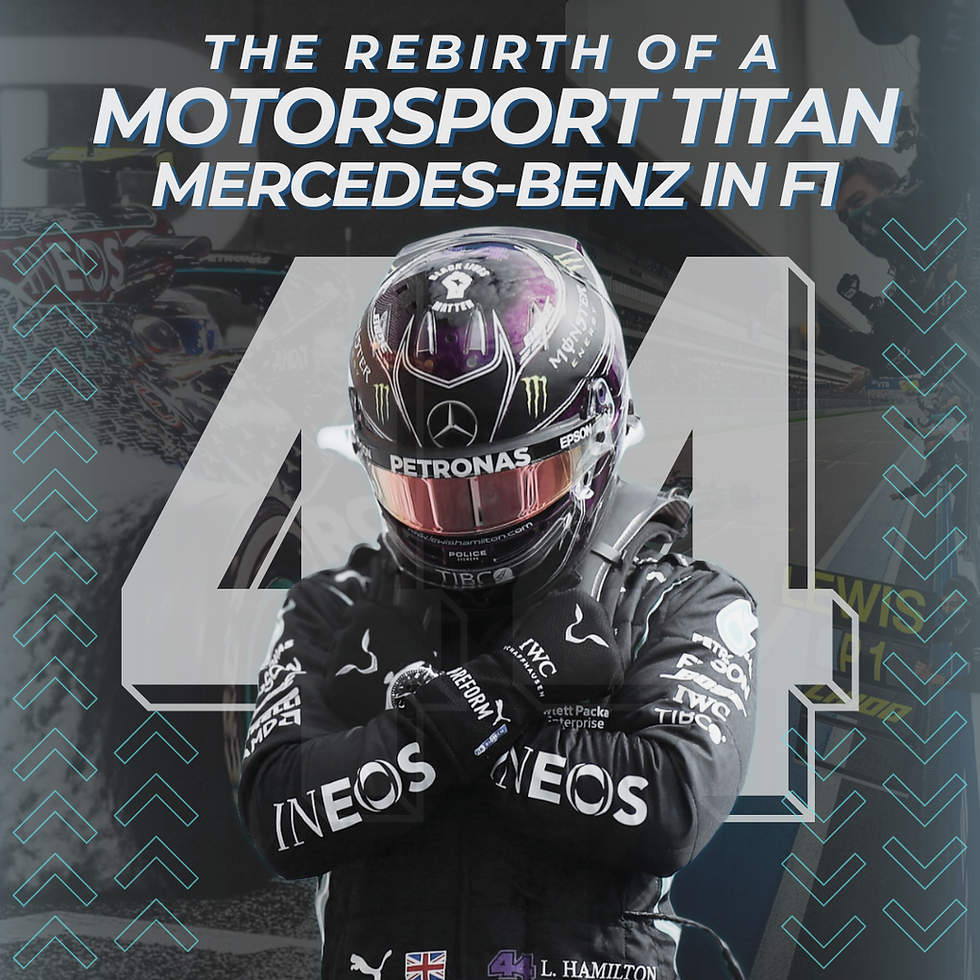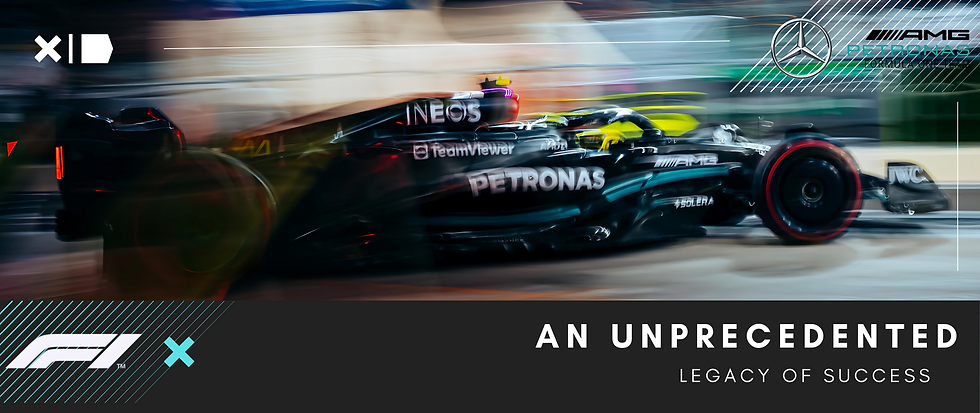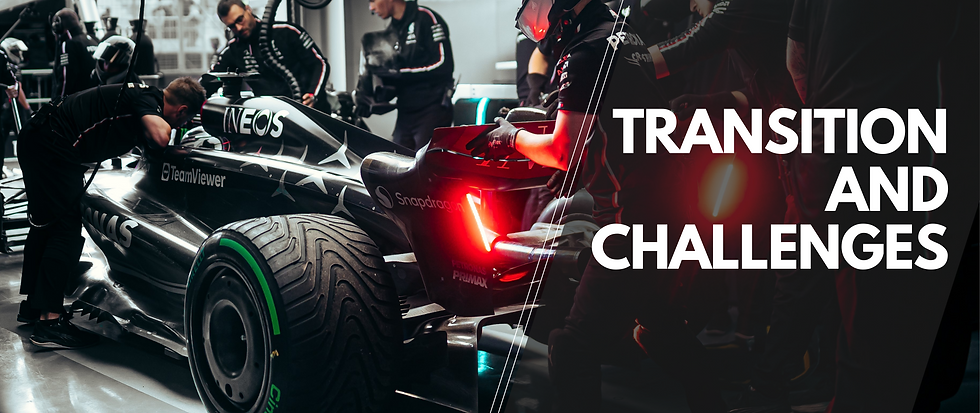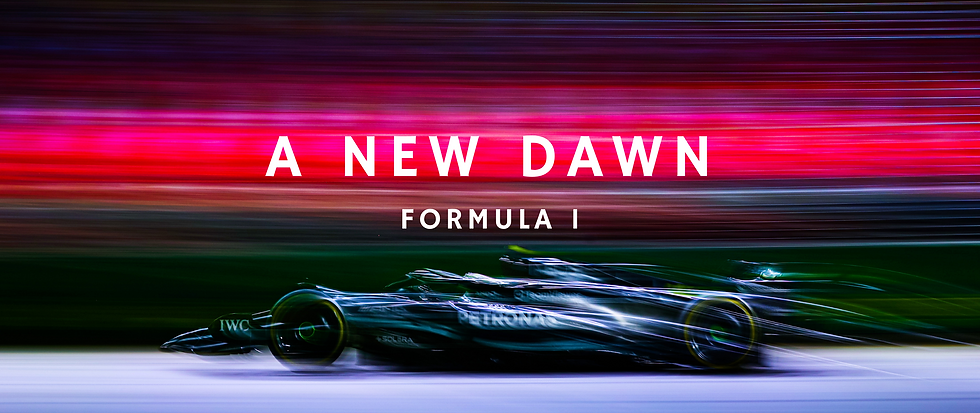The Rebirth of a Motorsport Titan: Mercedes-Benz in Formula 1
- FounderX Magazine

- Mar 5, 2024
- 3 min read
Updated: Apr 29, 2024
By Brun Zulfikarpasic

Over the past 8 years, Mercedes-Benz has not just participated in Formula 1; it has redefined the pinnacle of motorsport through a blend of technological brilliance, strategic acumen, and a relentless quest for supremacy. The tenure of James Allison as Chief Technical Officer (CTO) from 2018 to 2021 marked a period of unprecedented success and innovation. With Allison's departure and Mike Elliott's ascension, Mercedes faced the challenge of maintaining their dominance amid Formula 1's most significant regulatory changes in decades.

Mercedes-Benz's journey in Formula 1 over the last decade is a narrative of unmatched triumph. The team clinched 8 consecutive Constructors' Championships, a record that aligns them with the sport's most celebrated teams. Under the leadership of James Allison, Mercedes didn't just lead; they dominated, introducing revolutionary technologies like the Dual-Axis Steering (DAS) system. This innovation, which allowed drivers to adjust the toe angle of the front wheels, was a testament to Mercedes' pioneering spirit, contributing significantly to their competitive advantage until its ban by the FIA to preserve competitive balance.
The 2020 season was a showcase of Mercedes' relentless innovation, with the introduction of a groundbreaking rear suspension design aimed at enhancing aerodynamic efficiency. These technological advancements underscored Mercedes' position as leaders in innovation, setting new standards in Formula 1 engineering and performance.

The arrival of new 2022 regulatory changes in Formula 1 presented Mercedes with an opportunity for internal evolution, promoting Mike Elliott to the role of CTO. This transition aimed to leverage Elliott's expertise to navigate the team through upcoming challenges. However, the team faced unexpected hurdles with their W13 design, particularly with an ambitious no sidepods concept that led to exacerbated porpoising issues, contrary to the intended aerodynamic benefits.
Mercedes' response to these challenges was a testament to their resilience. Adapting to a more traditional design approach, similar to Red Bull Racing, the team managed to overcome initial setbacks, finishing second in the Constructors' Championship by the end of the 2023 season. This comeback story highlighted Mercedes' ability to learn, adapt, and evolve in response to the dynamic nature of Formula 1.

The anticipation for the 2024 season is electrifying, with Mercedes-Benz at the heart of speculation and excitement. The return of James Allison in the Chief Technology Officer role, combined with the ambition and talent of drivers like Lewis Hamilton, promises a compelling new chapter in the sport's history. The rivalry between Hamilton and Max Verstappen offers a captivating storyline, filled with intense competition, and the possibility of historic moments on the track.
Mercedes' preparation for the regulatory changes and their unwavering commitment to excellence are central to the high expectations surrounding their performance in the upcoming season. The team's ability to innovate and adapt remains key to their continued success in Formula 1.
Conclusion
Mercedes-Benz's journey in Formula 1 is a testament to the power of innovation, resilience, and the relentless pursuit of excellence. As the sport embarks on a new era, Mercedes' rich history of success, combined with a strategic and technical evolution, positions them as a formidable force in the quest for racing glory. The return of James Allison—and the ongoing development of their competitive strategy and technology—herald the beginning of another legendary chapter in Mercedes-Benz's Formula 1 saga.
This narrative not only underscores the technical and strategic milestones achieved by Mercedes, but also highlights the human element of motorsport—where leadership, vision, and teamwork play pivotal roles in shaping the fortunes of a team. The resilience shown by Mercedes in the face of adversity, their ability to innovate within the constraints of regulatory changes, and the anticipation surrounding their future endeavours encapsulate the essence of Formula 1 racing—where the pursuit of excellence is a never-ending journey.
As Mercedes-Benz prepares for the challenges and opportunities of the 2024 season, their legacy in Formula 1 continues to evolve. With a blend of historical success, technological innovation, and the anticipation of future achievements, Mercedes stands not just as a participant in Formula 1, but as a symbol of excellence and an architect of the sport's future.
MORE ABOUT THE AUTHOR

Brun Zulfikarpasic
Brun Zulfikarpasic is a former Electronics Lead for King’s Racing, a King’s College London Formula Student Team. Currently studying at the University of Cambridge—and participating in the development of a hydrogen powered catamaran, as part of the Cambridge University Riviera Racing Team. The boat will compete at the Monaco Energy Boat Challenge (and help pave the way for sustainable maritime transport around the world).



I'm not particularly into Formula 1, but I appreciate the update on Mercedes-Benz's journey in the sport. Always interesting to see how different industries evolve!❤️